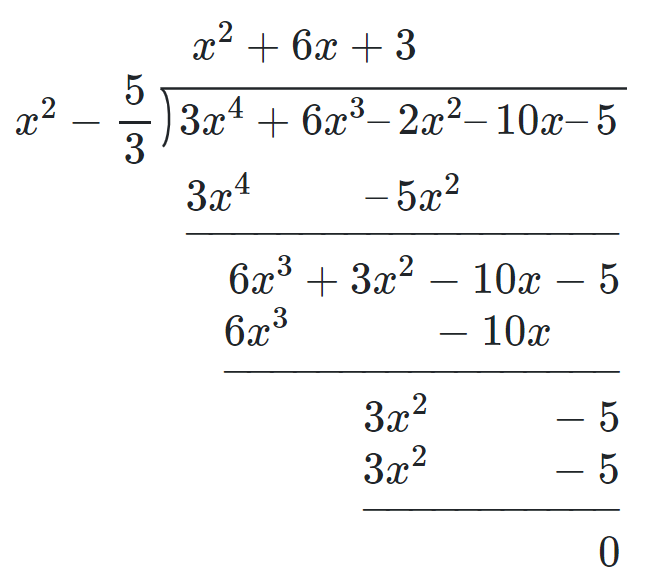Vachmi
Divide the polynomial p(x) by the polynomial g(x) and find the quotient and remainder in each of the following :
(i) $p(x)= x^{3}-3x^{2}+5x-3$, $g(x)=x^{2}-2$
(ii) $p(x)= x^{4}-3x^{2}+4x+5$, $g(x)= x^{2}+1-x$
(iii) $p(x)= x^{4}-5x+6$, $g(x)= 2-x^{2}$
Solution
(i) $p(x)= x^{3}-3x^{2}+5x-3$, $g(x)=x^{2}-2$
.PNG)
Quotient = $x - 3$
Remainder = $7x - 9$
(ii) $p(x)= x^{4}-3x^{2}+4x+5$, $g(x)= x^{2}+1-x$
.PNG)
Quotient = $x^2+x-3$
Remainder = $8$
(iii) $p(x)= x^{4}-5x+6$, $g(x)= 2-x^{2}$
.PNG)
Quotient = $-x^2-2$
Remainder = $-5x+10$
2
Check whether the first polynomial is a factor of the second polynomial
by dividing the second polynomial by the first polynomial.
(i) $t^2 - 3$, $2t^4 + 3t^3 - 2t^2 - 9t - 12$
(ii) $x^2 + 3x + 1$, $3x^4 + 5x^3 - 7x^2 + 2x + 2$
(iii) $x^2 + 3x + 1$, $x^5 - 4x^3 + x^2 + 3x + 1$
Solution
(i) $t^2-3$, $2t^4 + 3t^3-2t^2-9t-12$
.PNG)
As the remainder is zero, first polynomial is a factor of second polynomial.
(ii) $x^2 + 3x + 1$, $3x^4 + 5x^3-7x^2 + 2x + 2$
.PNG)
As the remainder is zero, first polynomial is a factor of second polynomial.
(iii) $x^3 - 3x + 1$, $x^5-4x^3 + x^2 + 3x + 1$
.PNG)
As the remainder is not zero, first polynomial is not a factor of second polynomial.
3
Obtain all other zeroes of $3x^4 + 6x^3-2x^2-10x-5$, if two of its zeroes are $\sqrt { \frac { 5 }{ 3 } }$ and -$\sqrt { \frac { 5 }{ 3 } }$.
Solution
Let $p(x) =$ $3x^4 + 6x^3-2x^2-10x-5$
The given zeroes are $\sqrt { \frac { 5 }{ 3 } }$ and -$\sqrt { \frac { 5 }{ 3 } }$
Hence $\left(x - \sqrt { \frac { 5 }{ 3 } }\right)$ $\left(x + \sqrt { \frac { 5 }{ 3 } }\right)$
= $\left(x^2 - \dfrac{5}{3}\right)$ is a factor.

Dividing $3x^4 + 6x^3-2x^2-10x-5$ by $\left(x^2 - \dfrac{5}{3}\right)$, we get $3x^2 + 6x + 3$
Let us factorize $3x^2 + 6x + 3$
$3x^2 + 6x + 3$
$ ⇒ 3x^2 + 3x + 3x + 3$
$ ⇒ 3x(x + 1) + 3(x + 1)$
$ ⇒ 3(x + 1)(x + 1)$
$∴ p(x) =$ $3\left(x^2 - \dfrac{5}{3}\right)(x + 1)(x + 1)$
∴ The other 2 zeroes are -1 and -1
4
On dividing $x^{3}-3x^{2}+x+2$ by a polynomial g(x), the quotient and remainder were $x-2$ and $-2x+4$ repectively. Find g(x)
Solution
Quotient × Divisor + Remainder = Dividend
$∴ (x - 2) × g(x) + (-2x + 4)$ = $x^{3}-3x^{2}+x+2$
$⇒ (x - 2) × g(x)$ = $x^{3}-3x^{2}+x+2 + 2x - 4$
$∴ g(x)$ = $\dfrac{x^{3}-3x^{2}+3x-2}{x - 2}$
$∴ g(x)$ = $x^2 - x + 1$
5
Give examples of polynomials p(x), g(x), q(x) and r(x), which satisfy the division algorithm and
(i) deg p(x)= deg q(x) (ii) deg q(x)= deg r(x) (iii) deg r(x)=0
Solution
According to Euclid's division lemma,
$p(x) = g(x) × q(x) + r(x)$ where $q(x) ≠ 0$
(i) Degree of quotient will be equal to degree of dividend when divisor is constant (degree is 0).
Let us consider the division of $8x^2 + 4x + 9$ by 4.
Here, $p(x) = 8x^2 + 4x + 9$ and $g(x) = 4$
$⇒ q(x) = 2x^2 + x + 2$ and $r(x) = 1$
Therefore, degree of p(x) and q(x) is same which is 2.
(ii) Let us consider the division of $2x^2 + 4x + 7$ by $x^2 + 2x + 1$,
Here, $p(x) = 2x^2 + 4x + 7$ and $g(x) = x^2 + 2x + 1$
Therefore, $q(x) = 2$ and $r(x) = 5$
(iii) Degree of remainder will be 0 when remainder obtained on division is a constant.
Let us consider the division of $10x^3 + 3$ by $5x^2$.
Here, $p(x) = 10x^3 + 3$ and $g(x) = 5x^2$
$q(x) = 2x$ and $r(x) = 3$
Therefore, the degree of $r(x)$ is 0.